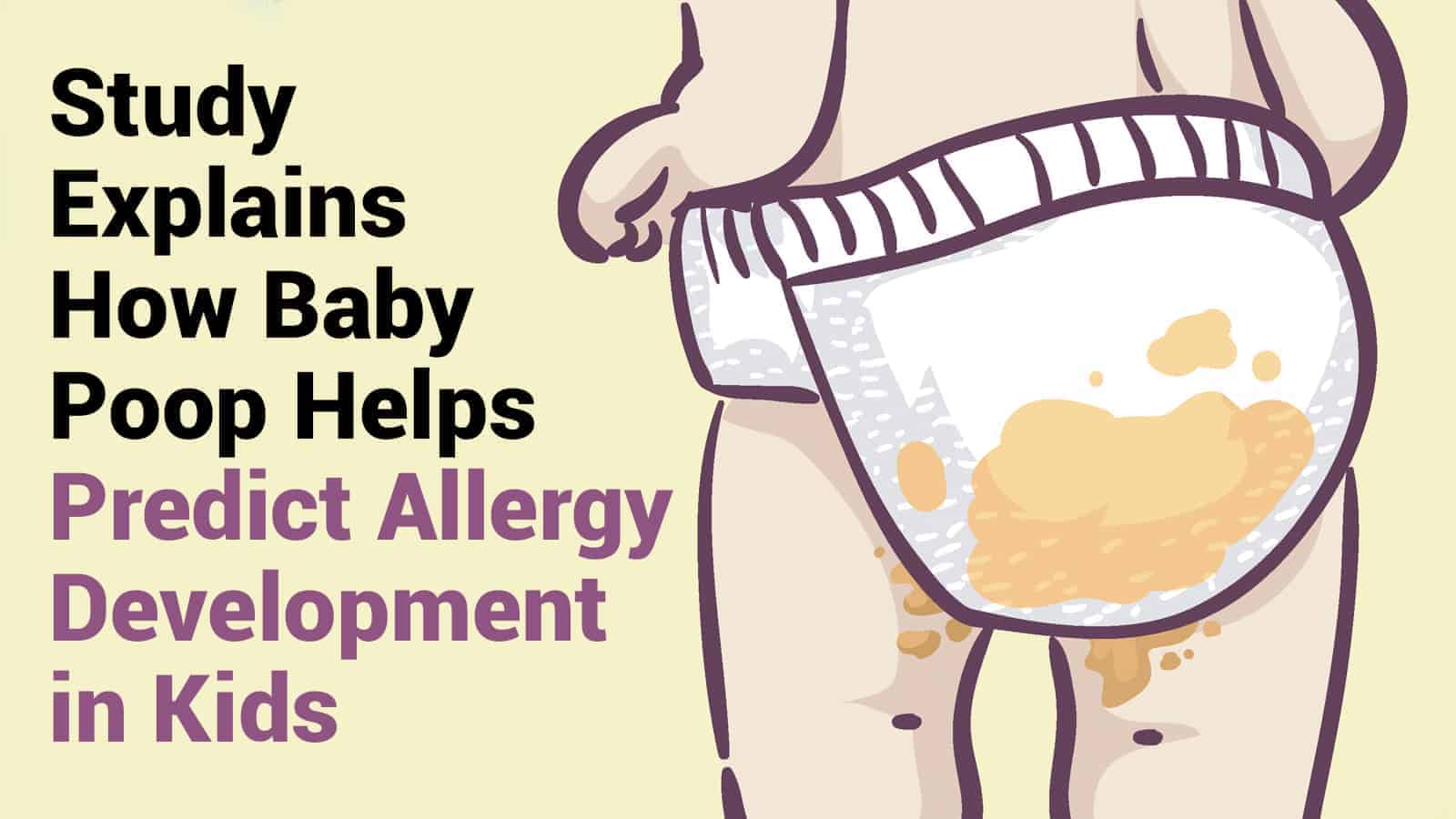It might sound strange, but scientists have found that analyzing baby poop can predict allergy development in kids. Researchers reveal that the contents of a baby’s first feces can determine whether a child develops allergies within one year.
The study, published in Cell Reports Medicine, was performed by a team of University of British Columbia (UBC) researchers.
Called meconium, the first baby poop of a newborn consists of materials ingested during development. These can include intestinal epithelial cells, skin cells, mucus, amniotic fluid, bile, proteins, fats, and water. Babies typically pass the thick, dark green substance in the first few hours and days following birth.
The meconium metabolome begins to form by gestational week 16 in the baby’s gut. It contains a wide variety of metabolites passed from the mother to the baby. The contents in meconium serve as the foundation for the initial microbiota.
When the baby starts breastfeeding or drinking formula, their body will eliminate the meconium. Then, their bowel movements will become standard as they digest the liquids. Meconium usually passes through the baby’s system in the first day or two of their lives.
The study’s senior co-author Dr. Brett Finlay, a professor at the Michael Smith Laboratories and departments of biochemistry and molecular biology, and microbiology and immunology at UBC, said this:
“Our analysis revealed that newborns who developed allergic sensitization by one year of age had significantly less ‘rich’ meconium at birth, compared to those who didn’t develop allergic sensitization.”
“Meconium is like a time capsule, revealing what the infant was exposed to before it was born. It contains all sorts of molecules encountered and accumulated from the mother while in the womb, and it then becomes the initial food source for the earliest gut microbes,” says the study’s lead author Dr. Charisse Petersen, a research associate in UBC’s department of pediatrics.
The study explaining how baby poop helps predict allergy development in kids
For the study, researchers analyzed meconium samples taken from 100 infants enrolled in the CHILD Cohort Study. This longitudinal, population-based birth cohort study leads maternal, newborn, and child health research. It’s the most extensive, most informative study of its kind worldwide.
After analyzing the data, researchers found an inverse relationship between baby poop and the risk of allergies. In other words, the fewer types of molecules a baby’s meconium had, the greater the chance of allergies.
Also, they found that fewer molecules led to changes in critical bacterial groups. These groups play a crucial part in the development and maturation of the gut microbiota. Babies who have a greater variety of gut microbes at birth tend to have a more robust immune system. So, it’s not surprising that babies with a less powerful microbiome are more susceptible to allergies.
Dr. Petersen said this:
“This work shows that the development of a healthy immune system and microbiota may actually start well before a child is born — and signals that the tiny molecules an infant is exposed to in the womb play a fundamental role in future health.”
The researchers used a machine-learning algorithm and combined meconium, microbe, and clinical data. This algorithm predicted whether an infant would develop allergies before turning one with a 76% accuracy rate. Researchers say it’s the most reliable prediction on child allergies to date.
The results of the study have important implications for infants with compromised immune systems, according to the researchers. Since gut imbalances begin in utero, the findings could reveal directly modifiable metabolic targets to prevent allergies.
“We know that children with allergies are at the highest risk of also developing asthma. Now we have an opportunity to identify at-risk infants who could benefit from early interventions before they even begin to show signs and symptoms of allergies or asthma later in life,” says the study’s senior co-author Dr. Stuart Turvey, a professor in UBC’s department of pediatrics, investigator at BC Children’s Hospital and co-director of the CHILD Cohort Study.
More about the relationship between infant gut health, allergy development, and immunity
Maturation of the gut microbiome begins immediately after birth when bacteria first enter the neonatal gut. These bacteria colonize the gut and form the immune system of the infant. The microbial community will continue to mature throughout the first few years of the baby’s life.
Unfortunately, our modern world contains far fewer microbes than our ancestors experienced. Some scientists believe that this loss of microorganisms populating the Earth and our guts may explain the uptick in numerous diseases. In the past 50 years, immunoglobulin E (IgE)-mediated (atopic) diseases in young children increased as intestinal flora decreased.
Atopic disorders include eczema (atopic dermatitis), food allergies, asthma, and allergic rhinitis. They affect around 30% of the population, and most children will have lifelong symptoms with few treatments available. However, studying prenatal factors which determine the composition of baby poop could lead to early detection of allergy sensitivity.
Factors influencing microbiota maturation include the following:
- maternal microbes
- mode of delivery (C-section or natural birth)
- gestational age
- breastfeeding vs. formula feeding
- geographical location
- family members
- host interactions
- maternal diet
- weaning
Scientists say that modern practices such as perinatal antibiotics, Cesarean births, and formula feeding negatively impact gut flora. While these practices undeniably save lives, they also make it more difficult for microbes to thrive. Children who receive antibiotics before age two, for example, have a higher risk of developing allergies, asthma, and obesity.
So how do you keep your gut healthy during pregnancy? Make sure to eat a wide variety of fruits, vegetables, and grains. This will ensure your baby receives all of the beneficial microbes before and after birth.
Final Thoughts: Studying baby poop can help identify the chance of allergy development in infants
A new study by Canadian researchers found that analyzing baby poop can predict allergy risk in infants. Babies excrete a substance called meconium within 24-48 hours of birth. Scientists have discovered that the fewer molecules in a baby’s meconium, the greater their allergy risk. They hope these findings will improve treatments and early development of allergies in infants moving forward.
















 Community
Community

